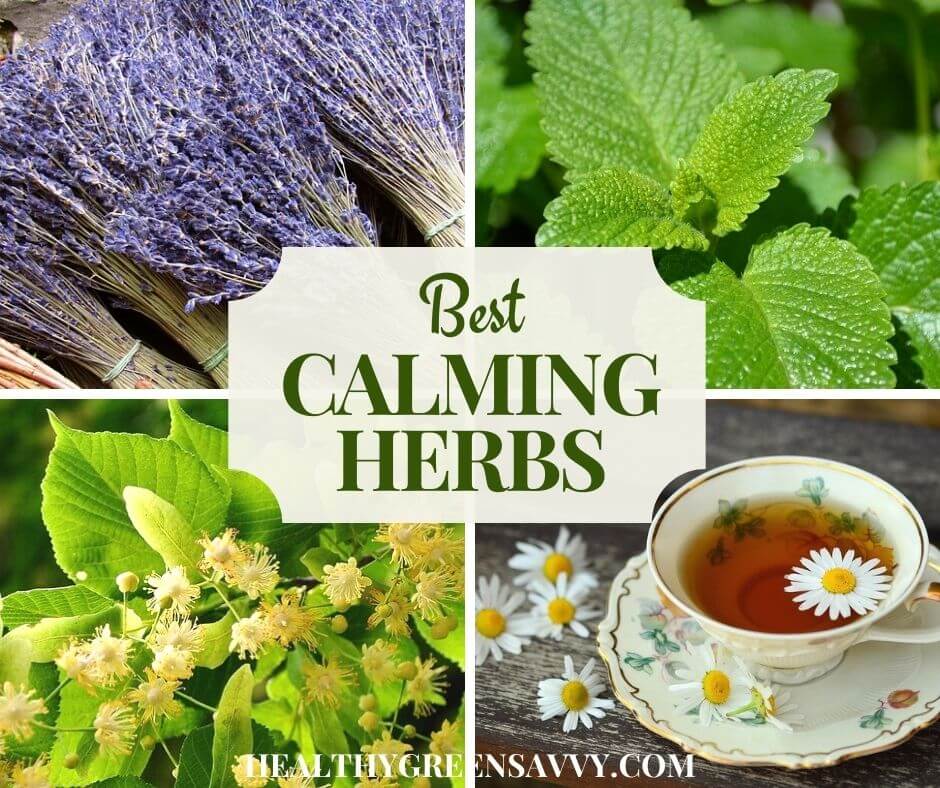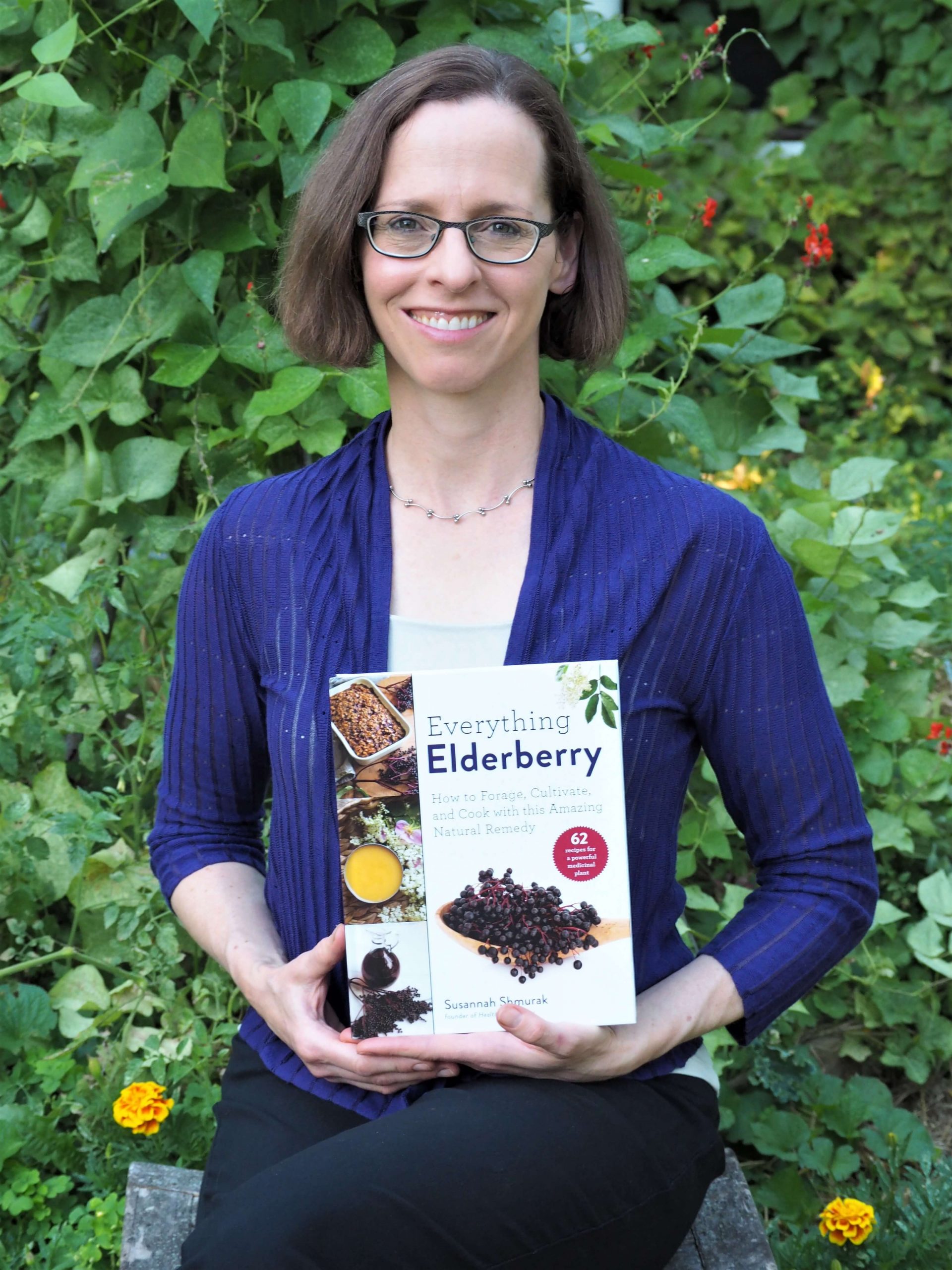Last Updated on June 4, 2024
It’s been a stressful year to say the least, and this time of any year we can often use some help relaxing. These calming herbs for relaxation and stress relief may help you meet the challenges of the times feeling a little more calm.

WHY CONSIDER CALMING HERBS?
Stress is a normal part of life, but when it goes on too long or affects our sleep, we need to take steps to deal with it to prevent negative health impacts. Chronic stress has been linked to numerous health conditions, including:
- Weight gain
- Decreased immunity
- Cardiovascular disease
- Sleep problems
- Cognitive problems
- Depression
- Shortened lifespan
There are lots of natural ways to manage stress, including exercise, laughter, and massage, which can help lower levels of the stress hormone cortisol. Try some of these 10 easy techniques to help reduce cortisol next time you feel stressed and you may be surprised at how much better they make you feel.
But sometimes when we deal with unavoidable stress continuing over the long term (2020, anyone?) we need extra support, and herbs that help the body and mind deal with stress may help.
HOW DO CALMING HERBS WORK?
Calming herbs are typically classed as “nervines,” plants with compounds that affect the nervous system. Here’s a helpful explanation of nervines from the Herbal Academy.
Some calming herbs help to counter the effects of an over-stimulated nervous system, while others work more slowly over time to strengthen the nervous system and modulate our response to stress. These are usually referred to as adaptogens.
Other herbs have sedative effects, which can make us sleepy. This effect may be helpful at night, but these herbs are best avoided during the daytime.
WHAT ARE THE BEST CALMING HERBS FOR RELAXATION?
Adaptogenic herbs have effects over the long-term, so it’s likely you won’t feel an immediate response. Adaptogenic herbs help your body better respond to stressors when taken regularly over a period of weeks or months.
Adaptogenic herbs include:
- Ashwagandha
- Tulsi
- Reishi
Other calming herbs can have a more immediate relaxing effect, helping you to unwind after a stressful day.
Relaxing herbs include:
- Lemon Balm
- Chamomile
- Lavender
- Linden
- Catnip
- Skullcap (tincture)
Some herbs have stronger sedative effects than others, so it’s wise to save those for times you want to sleep.
Herbs that may induce sleepiness:
- Valerian
- Passionflower
- California poppy
- Skullcap (infusion)
- Hops
Below are some of the most-used calming herbs with brief descriptions and details about how to use them. I’m listing the mildest, best-tolerated herbs first.
If you haven’t used herbs much, gentle, well-tolerated herbs like lemon balm, tulsi, chamomile, linden, and oatstraw are excellent choices for beginning to stock your herbal tea apothecary. They’re not only calming, but they taste delicious and contain beneficial plant compounds called polyphenols, which have been linked to lowered disease risk.
The list below includes some of the most commonly used and readily available calming herbs. Additional calming herbs to explore are listed at the end of the post.
HOW TO PREPARE CALMING HERBS FOR RELAXATION
For most of us, the most approachable way to use calming herbs is in herbal tea. The mere act of consuming a warming tea may also help to soothe us when we feel stressed.
While you can certainly purchase tea bags a make a quick cuppa, to get the most benefit from your herbal tea, you want to allow it to infuse, covered, for 20-30 minutes or even longer to extract the beneficial compounds.
For the herbs I use regularly, I typically buy 1-pound bags, which cost less per ounce and last a really long time. For herbs, I use less often or in smaller quantities, I buy 4-ounce bags or get very small amounts from my local co-op. If you do the math, you’ll find that buying your herbs in bulk will save quite a bit over tea bags if you drink herbal teas regularly.
You can grow many of these herbs easily. Here’s information on starting a medicinal herb garden if you’d like to explore the dozens of options for growing your own herbal remedies.
You can also buy calming herbs dried from companies like Starwest or Mountain Rose Herbs. Vitacost is also a great source for discounts on herbal remedies (as well as loads of healthy pantry staples). Amazon also carries most of these herbs in large bags from Frontier, Starwest, and other brands, and you can find smaller quantities from sellers on Etsy.
I typically make a very strong infusion in a teapot and let it steep several hours before pouring through a simple tea strainer. You can also get a teapot with a built-in infuser like this one on Etsy or this one on Amazon. I love these cast-iron Japanese teapots. Here are loads more options for quality teas and gear, which make great gifts for tea lovers.
For keeping calming herbs on hand, you can also consider using a tincture, which extracts different compounds and lasts for years. You can make your own tinctures by steeping your chosen herb (fresh or dried) in high-proof alcohol, or you can buy them already made. Major brands carry many tinctures you can find online or you can buy from small herbal businesses on Etsy.
If you want to try making your own tinctures, here are instructions from Herbal Academy.
CAUTIONS WITH CALMING HERBS
With any herb you’re considering using for the first time, consult a physician if you have any underlying health conditions or take prescription drugs. Many herbs can enhance or decrease the action of drugs, so it’s important to check for contraindications.
Start with a very small amount of the calming herbs you’ve chosen to make sure you don’t have an adverse reaction, typically 1/4 the recommended dose.
If you want to learn more about using medicinal herbs to support health, check out these fantastic herbal medicine books and the array of herbal courses offered by The Herbal Academy. Here’s a list of the courses they’re currently enrolling.
GENTLE CALMING HERBS
Top Calming Herbs
Lemon Balm
Renowned as a premier herb for relaxation, lemon balm is a popular ingredient in herbal sleep tea blends for its soothing effects on the nervous system. I love the flavor of fresh lemon balm and grow as much as I can during in our small permaculture yard during our short growing season.
Lemon balm is in the mint family and can spread aggressively in milder climates, so proceed accordingly if you’re adding it to your herb garden.
During the colder months, I incorporate plenty of dried lemon balm into my nightly sleep-promoting tea. Lemon balm doesn’t have a strong sedative effect, though, so it’s perfectly fine to drink throughout the day if you need help tamping down feelings of stress. It’s great as a sun tea. Lemon balm is also considered uplifting, so it may help improve mood as well.
Lemon balm is most often used dried or fresh in tea, but you can also get it as a tincture or glycerite. Here are some options on Amazon.
When I travel, I use a fantastic bagged sleep tea from Clipper. Their “Snore and Peace” organic tea contains lemon balm, chamomile, and lavender. It’s delicious and helps me sleep more soundly.
Chamomile
One of the most common relaxing herbs, chamomile has been used for centuries to relieve tension and pain. Studies have supported the longstanding use of chamomile to promote restful sleep.
You’ll see two types of chamomile, German (Matricaria recutita) and Roman (Chamaemelum nobile). They’re used very similarly, though the German variety is less bitter and makes a more pleasant cup of tea.
Most often consumed as a tea or infusion, chamomile can also be used topically as an essential oil.
–> Note that chamomile is in the aster family, so if you have a ragweed allergy, best to skip it.
Lavender
Lavender has received the most attention for its delicious scent, which has been shown to promote sleep and reduce anxiety. You can use the essential oil to promote calm in a diffuser (I like this personal diffuser pendant) or apply it topically in a roll on blend from Plant Therapy. I love Plant Therapy synergy blends. Their stress relief blend and kid safe night time blend contain lavender, chamomile, and other relaxing oils.
Badger also makes a lovely sleep balm containing lavender and other relaxing oils that I’ve used for years. You can also make your own stress-relief balm with this recipe from Herbal Academy. Or make your own relaxing lavender bath salts by combining dried lavender with epsom salts.
Lavender is also delicious in tea, combined with chamomile or other herbs you choose. Traditional Medicinals makes a delicious tea blend containing chamomile and lavender.
If you grow lavender in your garden, it’s worth knowing that the leaves as well as the buds can be used in a variety of ways. Here are some ideas for what to do with lavender leaves. Find out how to grow lavender from seed and you can always have plenty of this wonderful soothing herb on hand when you want it.
Linden
Another top pick for gentle nervines, linden has a lovely floral flavor that makes it a delicious addition to any herbal tea blend. It’s anti-spasmodic, so it can be helpful for muscle pain and tension, as well as a natural treatment for coughs. It’s considered mild enough for children. Here’s more on linden from the Herbal Academy.
You can buy linden or gather your own from local linden trees when they blossom in spring. Linden is just one of many wild herbs you can forage for making herbal remedies.
Catnip
Catnip is commonly recommended as an herb to help promote sleep. Its flavor is quite strong, so I tend to add small amounts of fresh herb to the teapot with plenty of lemon balm and other calming herbs. It’s easy to grow but can be invasive. You can also buy it dry.
ADAPTOGENIC HERBS FOR RELAXATION
Milky Oats/Oatstraw
Milky oats are the unripe seeds of the oat plant at the brief stage where they exude a milky substance. Because the active compounds are in liquid form, milky oats are generally used as a tincture. Like other adaptogenic herbs, milky oats is considered most beneficial when taken over a long period of time and is considered extremely useful for soothing frayed nerves. Learn more about using milky oats, and check out some options for milky oats tinctures at Etsy.
Oatstraw is the stem of the plant, and it’s a popular addition to tea blends, imparting a pleasant, grassy flavor and restorative minerals. You can buy it here at Starwest or here at Amazon. Herbalists recommend consuming it regularly to reap its benefits.
Making your own tinctures from homegrown herbs can save you a good deal of money over buying. Here’s what to know about growing and harvesting your own oats from the Herbal Academy.
Tulsi
Also known as Holy Basil, tulsi is a much-used herb in Ayurvedic medicine. There are many kinds of tulsi, which are used somewhat interchangeably. You can experiment with what you like best and even consider growing your own in your medicinal herb garden.
Tulsi has natural pain-relieving properties and is also considered a beneficial herb for the immune system, making it especially useful when stress compromises our immune response. Here’s a review of the scientific studies on tulsi.
One of the easiest ways to incorporate tulsi into your relaxation routine is as a tea. You can buy tulsi in bulk or if you want something extra quick and easy, Organic India makes a variety of delicious tulsi blends.
Ashwagandha
Ashwagandha is one of the best-known of the adaptogenic herbs, prized for its ability to soothe feelings of stress when taken over a long period. A small study found a significant reduction in feelings of stress with 600mg ashwagandha supplementation for eight weeks. Ashwagandha is usually consumed as a powder, so it’s easiest to take as a supplement. You can find it at Starwest, Perfect Supplements, Vitacost, and Amazon.
Reishi
Reishi is a medicinal mushroom and adaptogen traditionally used to support the immune system and help the body handle stress. It’s available as a supplement, and you will often find it added to brews meant to help you relax. Four Sigmatic makes some delicious teas with reishi to make it easy to get a daily dose of this soothing mushroom. You can find Four Sigmatic products here, and get an extra 10% off with the code ‘SAVVY.’
SEDATING HERBS FOR RELAXATION & SLEEP
Skullcap
A commonly-recommended herb for stress, skullcap has stronger relaxing properties than the herbs listed above. A strong infusion of skullcap may have more sedative effect than a tincture, which can be used be for dealing with acute stress when you don’t want to induce drowsiness.
Skullcap is quite bitter, so take as a tincture or use blended with better-tasting herbs in tea. Blend with any of the herbs above for a more potent sleep-promoting tea.
Valerian
Valerian is a popular herb for aiding sleep and is a powerful anti-spasmodic as well, making it a good choice if muscle spasms or a dry cough makes it hard to sleep. You will often find valerian in herbal teas for sleep, but herbalists typically recommend the tincture. One of my favorite tea brands, Pukka, makes a sleep tea with organic valerian, chamomile, linden, tulsi, and lavender.
People with warm rather than cool constitutions might not respond well, and a small percentage of people may find valerian stimulates them instead of relaxes.
Passionflower
Another herb commonly recommended for sleep, passionflower not only calms the nervous system, it’s also an antispasmodic, helpful if sleep is compromised by muscle pain or digestive issues. A longtime remedy for anxiety, passionflower can be added to tea blends or taken as a tincture.
California Poppy
Herbalists often recommend California poppy for calming frayed nerves, alleviating anxiety, and promoting restful sleep. Its bitter flavor means California poppy is best taken as a tincture. Starwest sells both tinctures and dried California poppy, and you can also consider adding this lovely flower to your summer garden.
Hops
A powerful sedative, hops has been studied for its ability to relieve stress and promote sleep, often in combination with valerian and passionflower. Hops is quite bitter and is usually taken as a tincture or supplement. Note that hops contains phytoestrogens.
OTHER CALMING HERBS TO EXPLORE
Less common herbs for relaxation are sometimes recommended by herbalists. If you want to know more about them, I highly recommend consulting herbal guides like Matthew Wood’s Book of Herbal Wisdom, Maria Noel Groves’s Body into Balance, or JJ Pursell’s Herbal Apothecary.
Additional herbs for relaxation:
- Motherwort
- Blue Vervain
- Kava
- St. John’s Wort
- Gotu Kola
- Wood betony
Which are your favorite calming herbs for relaxation and stress relief? Please share in the comments!
Pin to save these calming herbs for later!
Disclaimer: I’m a health enthusiast, not a medical professional. Content on this website is intended for informational purposes only and is not meant to provide personalized medical advice. Please consult them for more information and a licensed professional for personalized recommendations.
Calming herbs photo credits: relaxa1, PollyDot, Jenő Szabó, congerdesign, Maite Ramos Ortiz, Jacques GAIMARD

Susannah is a proud garden geek and energy nerd who loves healthy food and natural remedies. Her work has appeared in Mother Earth Living, Ensia, Northern Gardener, Sierra, and on numerous websites. Her first book, Everything Elderberry, released in September 2020 and has been a #1 new release in holistic medicine, naturopathy, herb gardening, and other categories. Find out more and grab your copy here.








 Hi, I'm Susannah, a garden geek, energy nerd, and fan of healthy food and natural remedies. Need some simple, practical solutions for living healthier and greener? You've come to the right place! More about me and my green projects
Hi, I'm Susannah, a garden geek, energy nerd, and fan of healthy food and natural remedies. Need some simple, practical solutions for living healthier and greener? You've come to the right place! More about me and my green projects